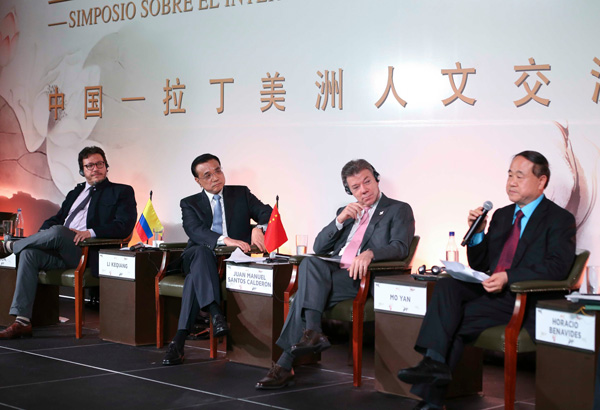Green-tea flavored coffee: a simile for cultural ties
By ZHAO YINAN in Bogota and ZHANG YUNBI in Beijing (China Daily USA) Updated: 2015-05-23 08:27
 |
|
Premier Li Keqiang and Colombia President Santos looks to Mo Yan, a Chinese Nobel Literature Prize winner, as he speaks during a China-Latin America cultural exchange seminar in Bogota on Friday. [Photo/Xinhua] |
"In my dreams, I once had coffee with you, and the Colombian coffee was blended with a flavor of Chinese green tea."
"I'd even worked out the first line I'd like to tell him when I finally got the chance to meet him in person," Chinese writer Mo Yan said of the late Colombian novelist Gabriel Garcia Marquez, who died in 2014 at the age of 87.
Mo, a winner of the Nobel Prize in Literature, as was Garcia Marquez, spoke at a China-Latin America culture seminar on Friday.
Mo said many writers were greatly influenced by Garcia Marquez's writing, and he had dreamt of meeting the icon of Latin American literature famous for his magic realism in One Hundred Years of Solitude.
The description was an apt simile to describe the cultural exchanges between China and Colombia, and Latin America at large.
Mo was one of a dozen of Chinese and Colombian writers and artists who gathered in Bogota to discuss the similarities on Friday, and also future exchange plans between China and Latin America.
Chinese Premier Li Keqiang, who was on a two-day visit to the South American country, and Colombian President Juan Manuel Santos also joined the discussion.
Li, who signed agreements to expand cultural exchanges with Santos on Thursday, said literature can work as a great medium to promote communication between China and Latin America, and that writers can inspire creativity between the two peoples.
"Literature work is the writer's imagination based on the description of reality, so it can influence a lot of people from all walks of life," Li said.
As Chinese poets could often produce great works after drinking alcohol, Li said that coffee, which Colombia is famous for, also has helped fuel some creative genius in Latin America.
Tang Jun, deputy head of the Institute of Latin American Studies at Zhejiang International Studies University, said future highlights of China-Colombia cooperation may be cultural to complement the industrial, such as in mining, agriculture and electronics manufacturing.
Tang said that as bilateral economic and trade ties grow, the cultural link requires greater emphasis.
Wu Changsheng, director of the Latin American Studies Center under the China Foundation for International Studies, said that China and Latin American countries have something to offer each other, and they should "learn from each other when it comes to cultural exchanges".
Both China and Latin America were birthplaces of cultures, he said, "while China is home to the oriental civilization, Colombia has nurtured the civilization of the Americas".




